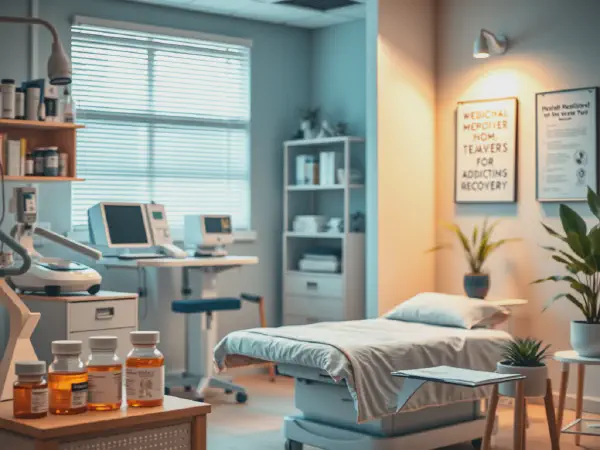Comprehensive Guide to Medically Assisted Treatment for Addiction in Columbus

Medically Assisted Treatment for Addiction in Columbus
Medically Assisted Treatment for Addiction in Columbus is gaining recognition as a vital approach to assisting individuals struggling with substance use disorders. This treatment modality combines the use of FDA-approved medications with counseling and behavioral therapies to help patients overcome addiction. In a city grappling with rising addiction rates, Medically Assisted Treatment provides a framework for recovery that is both effective and compassionate.
In Columbus, there are several clinics and treatment centers that specialize in Medically Assisted Treatment for Addiction. These facilities offer tailored programs to meet the unique needs of each patient, ensuring a supportive environment for recovery. The approach focuses on not just alleviating withdrawal symptoms but also reinforcing healthy coping mechanisms through counseling and support groups. As addiction continues to impact families and communities, accessing these resources becomes crucial for those in need.
Moreover, Medically Assisted Treatment for Addiction in Columbus emphasizes the importance of ongoing support and monitoring throughout the recovery process. Patients receive comprehensive care, which may include routine check-ins and adjustments to their treatment plan based on progress and individual needs. This commitment to care aims to keep patients engaged in their recovery journey and reduce the likelihood of relapse, ultimately cultivating long-term sobriety and well-being.
As awareness of addiction issues increases, so does the push for more accessible treatment options in Columbus. Community outreach programs are being developed to educate the public about the benefits of Medically Assisted Treatment, reducing the stigma surrounding addiction and promoting understanding. By fostering an informed community, Columbus aims to create a supportive network that encourages individuals to seek help without fear of judgment.
In conclusion, Medically Assisted Treatment for Addiction in Columbus represents a progressive step toward addressing the complexities of substance use disorders. With a focus on collaborative care, personalized treatment plans, and community support, this approach not only aids individuals in overcoming addiction but also enhances the quality of life for both patients and their families.
Overview of Medically Assisted Treatment
Medically Assisted Treatment (MAT) is a comprehensive approach to treating substance use disorders. It utilizes medications, in conjunction with counseling and behavioral therapies, to support individuals in achieving recovery from addiction. MAT is particularly effective for opioid and alcohol use disorders, as it addresses both the physiological cravings and the psychological aspects of addiction.
There are several types of medications used in Medically Assisted Treatment, including Methadone, Buprenorphine, and Naltrexone. Methadone is a long-acting opioid that helps to alleviate withdrawal symptoms and cravings for those addicted to opioids. Buprenorphine is a partial agonist that also mitigates withdrawal and cravings, while Naltrexone blocks the euphoric effects of opioids and alcohol, assisting individuals in maintaining sobriety. Each of these medications is prescribed based on individual patient needs and circumstances.
Historically, Medically Assisted Treatment emerged as a response to the opioid epidemic, offering a more humane and effective way to treat addiction. Since its inception, MAT has evolved significantly, gaining empirical support and acceptance within the medical community. In recent years, treatment protocols have expanded to include a wider range of substances, promoting greater hope for those suffering from various forms of addiction.
Exploring effective recovery options reveals the critical role of Medications for Substance Use Disorders in treatment plans.
Benefits of Medically Assisted Treatment
One of the primary benefits of Medically Assisted Treatment is the reduction of withdrawal symptoms. Patients undergoing withdrawal from substances like opioids may experience severe discomfort, which can be debilitating and discouraging. MAT minimizes these symptoms, allowing individuals to focus on their recovery without the added strain of physical discomfort.
Additionally, Medically Assisted Treatment significantly lowers relapse rates among individuals in recovery. Studies have shown that patients who engage in MAT have higher retention rates in treatment and are more likely to sustain their sobriety over time. This effectiveness is attributed to the stabilization provided by the medications, along with the personal empowerment gained through the recovery process.
Improved quality of life is another notable outcome associated with Medically Assisted Treatment. By alleviating the physical and mental challenges of addiction, patients can reintegrate into their personal and professional lives, rekindling relationships and pursuing career goals. The holistic approach of MAT, which encompasses both medical and therapeutic support, fosters a sense of hope and renewed purpose for many individuals in recovery.
Local Resources for Medically Assisted Treatment
Columbus is home to several treatment centers that provide Medically Assisted Treatment for addiction. Notable facilities include the Columbus Recovery Center, Brightview Health, and the Ohio State University Wexner Medical Center, all of which offer comprehensive MAT programs tailored to individual needs. These centers ensure that patients have access to the medications and support necessary for effective recovery.
In addition to treatment centers, Columbus hosts numerous support groups and recovery meetings, such as Narcotics Anonymous (NA) and Alcoholics Anonymous (AA), which are crucial for individuals seeking community and shared experiences during their recovery journeys. These groups provide a sense of belonging and understanding, which can significantly enhance the recovery process.
For those seeking Medically Assisted Treatment in Columbus, resources such as the Ohio Substance Abuse Recovery Resource Center can guide individuals in finding local MAT providers and treatment options. Many providers offer online and in-person consultations to help assess the most suitable treatment plans for potential patients.
Patient Experience with Medically Assisted Treatment
Personal testimonials from Columbus residents highlight the transformative impact of Medically Assisted Treatment on their lives. Many individuals have expressed gratitude for the support received from care providers, emphasizing how MAT has offered them a second chance at life. These stories illustrate the diverse backgrounds and unique journeys of patients and serve as a testament to the efficacy of the treatment.
Success stories abound, with many patients celebrating significant milestones in their recovery thanks to Medically Assisted Treatment. However, challenges also persist, including navigating the complexities of addiction, cravings, and potential relapses. The importance of ongoing support and adjustments within treatment plans remain critical in addressing these obstacles, ensuring that patients receive the necessary guidance and care throughout their recovery journeys.
The importance of personalized treatment plans cannot be overstated when it comes to Medically Assisted Treatment. Each patient's experience with addiction is unique, necessitating tailored interventions that consider their specific situations, needs, and goals. By working closely with healthcare providers to develop individualized plans, patients are empowered to take charge of their recovery and achieve sustainable results.
Legal and Insurance Aspects of MAT in Columbus
Understanding insurance coverage for Medically Assisted Treatment is essential for individuals seeking help in Columbus. Many insurance plans cover MAT, particularly when prescribed by licensed professionals. Patients are encouraged to contact their insurance providers to inquire about specific coverage details and the types of treatments that may be included.
In Ohio, state laws regulate the use of Methadone and Buprenorphine within Medically Assisted Treatment protocols. These regulations ensure the safe and responsible distribution of medications to patients while also prioritizing public health and safety. Staying informed about legal requirements can help patients and families navigate the treatment process more effectively.
For those facing legal challenges related to treatment access or insurance disputes, several resources are available in Columbus. Organizations such as the Ohio Legal Assistance Foundation provide legal assistance and support specifically catered to individuals seeking treatment for addiction, ensuring that patients can focus on their recovery with the necessary resources at hand.
